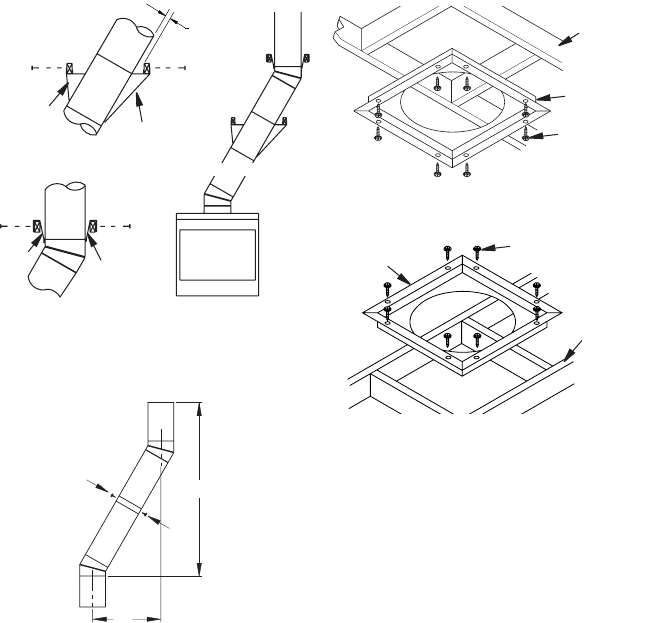
www.fmiproducts.com
111026-01J8
VENTING INSTALLATION
Continued
Figure 9 - Elbow Offset
B
A
Screws
FIRESTOP SPACERS (3600FS-8DM-1)
Firestop spacers are required at each point
where the chimney penetrates a oor space.
Their purpose is to establish and maintain
the required clearance between the chimney
and the combustible materials. When the pipe
passes through a framed opening into a living
space above, the restop must be placed onto
the ceiling from below as shown in Figure 10.
They also provide complete separation from
one oor space to another or attic space as
required by most codes. When the double wall
pipe passes through a framed opening into an
attic space, the restop must be placed into an
attic oor as shown in Figure 11.
Figure 10 - Firestop Spacer with Living
Space Above Ceiling
Figure 11 - Firestop Spacer with Attic
Space Above Ceiling
Existing
Ceiling
Frame
Firestop
Spacer
Screws or
Staples
(Min. of 8)
Firestop
Spacer
Screws or Staples
(Min. of 8)
PENETRATING ROOF
To maintain a 1" clearance to the pipe on a
roof with a pitch, a rectangular opening must
be cut.
1. Determine center point through which pipe
will penetrate roof.
2. Determine center point of roof. Pitch is the
distance the roof drops over a given span,
usually 12". A 6/12 pitch means that the
roof drops 6" for each 12" one measure
horizontally down from the roof rafters.
3. Use roof opening chart (Figure 12, page
9) to determine the correct opening length
and ashing required.
4. Remove the shingles around opening
measured. Cut out this section.
5. Add next sections of pipe until end pen-
etrates roof line. Check to see that the
proper clearances are maintained. Extend
chimney by adding sections of double wall
pipe until pipe is minimum of 30" above the
highest point of the roof cutout. Termination
and chimney must extend a minimum of
36" above the highest point where it passes
through the roof.
Existing
Ceiling
Frame
Figure 8 - Ceiling Support Pipe
12S-8DM
2" Min.
Straps
Straps
Straps
Straps
Detail A
Return Elbow
Detail B
Angle Firestop
See Detail A
See Detail B


















